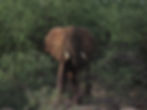A Mysterious Elephant
- Maxwell Lemartile
- Jul 28, 2022
- 1 min read

During interactions with the community, they shared stories about the wildlife they encountered. One early morning, Layioni (name changed for privacy) a 15-year-old boy, went to look after their herd of camels in the fields. He noticed a dead elephant carcass and because of its big size, he started to play on it. In the evening, he decided to inform his friends so that the following morning they could all graze around that area and enjoy playing with the carcass together. The boy wanted to challenge his friends to find out who could get up and down the dead elephant the most. In the evening, Layioni gathered the boys and shared his experience.
The following morning, Laiyoni and his friends set out to the field where the dead elephant was lying. The carcass was missing! He realized that the missing carcass meant that the elephant was sleeping, not dead. Shocking! The company of the boys was not lucky enough to see the elephant, so grazing for the day went on as usual.

Layioni was in disbelief for 2 days and could not fathom how a dead elephant could go missing. What if the elephant could have woken when he was playing with it? It was a matter of life and death. So many questions went unanswered in his little head.
Twelve years later, Layioni is now grown up and because of his childhood experience with this elephant, he swears that he will never step near dead elephants again. Not unless there is a community or Kenya Wildlife Service rangers involved.





